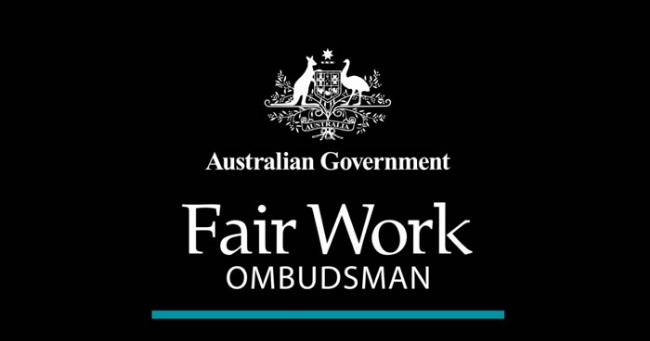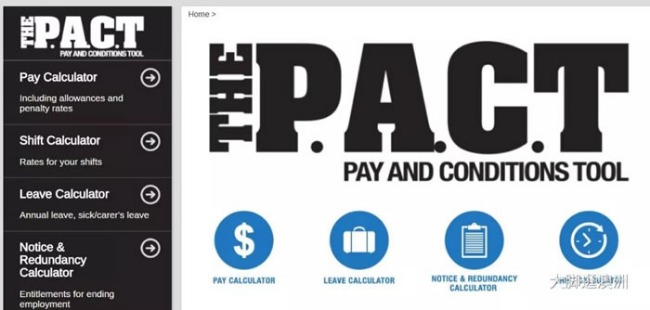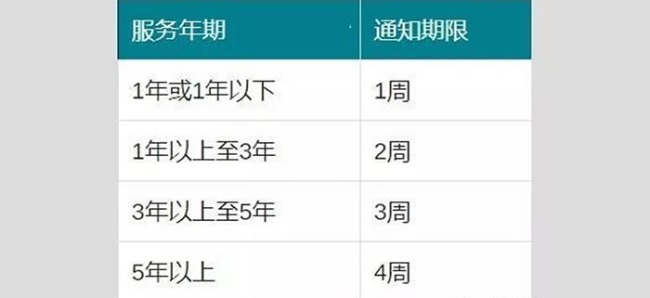All the information in this article comes from the Office of the Fair Work Ombudsman (FWO- Fair work Investigator's Office, Australia's government Agency. FWO can help you understand your rights and responsibilities at work.

For example, overseas students in Australia may work part-time or do some temporary work while studying in Australia. According to specific jobs, the vast majority of people should be paid at least $18.29 per hour. In the case of casual employees, the hourly salary should exceed $22.86. Employees may be entitled to higher pay depending on whether the industry or shift has overtime and holiday pay. Payroll Calculator, www.fairwork.gov.au/PACT

Introduction: rights and interests to work in Australia
Workplace regulations apply to all employees. Everyone working in Australia, including overseas personnel, has a defined right to work and is protected accordingly.
What is the National Employment Standard?
The National Employment Standard (National Employment Standards,), or: NES), sets ten minimum treatment standards for all employees. They are:
Maximum number of working hours per week: 38 hours per week, plus reasonable overtime.
Flexible schedule may be required: some employees may request changes in their working schedule.
Baby leave (parental leave): if a child is born or adopted, the employee may have up to 12 months of unpaid leave and may request an additional 12 months.
Annual leave (annual leave): four weeks paid vacation every year.
Personal / nursing leave (personal/carer's leave) and bereavement sick leave (compassionate leave): 10 days a year paid personal / nursing leave (sometimes referred to as sick leave [sick leave]) and two days in bereavement provided upon request.
Community service leave (community service leave): is required to take leave for volunteer crisis management activities or juries.
Long Service leave (long service leave): employees are entitled to paid leave for long service with the same employer.
Public holidays: pay breaks are available on statutory holidays unless there is a reasonable requirement to work overtime.
Termination notice (notice of termination) and layoff pay (redundancy pay): dismissal of an employee must be notified in advance. Notice can be up to five weeks, layoffs (severance payments) up to 16 weeks.
Fair work Information statement (Fair Work Information Statement): this is a document that must be made available to all new employees.
What kind of labor ruling or business agreement applies to my job?
The (awards) is a legally binding document that sets out the conditions under which you are entitled during work, including salary, working hours, rest, holidays, overtime pay and overtime. Different industries and different types of work may have corresponding labor decisions.
Visit www.fairwork.gov.au/awards to learn about labor decisions that apply to your industry.
The enterprise labor agreement (enterprise agreements) sets the minimum wage standard and the workplace treatment condition. The applicable enterprise labor agreement replaces the corresponding labor ruling. Employers should tell you whether your workplace is governed by corporate labor agreements.
How much do I deserve?
The wages you receive must not be lower than the minimum wage set out in labor rulings or corporate labor agreements. All your working hours should be paid. If you need to work or work overtime on weekends, public holidays, there are usually higher wage rates. Salary criteria are based on the work done by the employee, their age, experience, qualifications, and industry. In general, employers give employees a raise on July 1st of each year.
Am I a full-time, part-time or casual employee?
Before starting a new job, you should ask your employer to confirm the nature of your employment relationship, as it affects your hours of work, wage rates and leave entitlements.
Full-time employees (full-time employees) work 38 hours a week and are of a continuous nature. They have fixed working hours, and employers can ask them to accept reasonable overtime.
Part-time employees (part-time employees) work less than 38 hours a week and are of a continuous nature. Such employees have more regular working hours, and employers can also require them to accept reasonable overtime. Part-time employees are entitled to benefits including annual leave and personal / nursing leave, based on their usual hours of work.
Temporary employees (casual employees) work hours per week is not fixed and insecure. They usually receive a "temporary pay" (casual loading) (higher than the usual wage rate) because they do not receive other benefits such as paid sick leave or annual leave.
How to pay taxes and pensions?
Your employer must deduct the tax payable from your salary. It is illegal for an employer to pay a "cash-in-hand" (cash in hand) without withholding taxes. If your monthly income exceeds a certain amount, your employer must pay your pension in accordance with the law. The pension is an amount other than the minimum wage you receive and cannot be deducted from your salary.
What written documents should I get?
The employer should provide you with the corresponding salary form (pay slip). Within one day after paying you the salary. At the same time, employers must keep information about hiring you, including your salary, hours of work, and leave.
The payroll must include:
Name of employe
Employer's ABN (Australian Business number)
Name of employee
Date of compensation paid
Salary settlement period
Amount before and after withholding tax
The payroll also requires records of bonuses, subsidies, pay-back rates, deductions, and retirement provident fund (superannuation) contributions.
What should I pay attention to?
False contract (sham contracting): if you actually belong to an employee, the employer cannot employ your service as an independent contractor (with ABN number).
Replace salary with in-kind or service: all your working hours must be paid. The employer cannot replace your salary with food or clothing.
Kickoff: the employer should not withhold your salary for damage to the goods, shortage of cash, or failure of the customer to pay.
Discrimination: employers should not discriminate against you on the grounds of your race, sex, age, or religion.
Tip: it is a good practice to keep track of the date, time, rest time, supervisor information and leave. Log my work hours application (Record my hours app) can help you track your actual work hours, please download them at www.fairwork.gov.au/app.
Your responsibility.
As an employee, you must fulfill the relevant responsibilities to the employer. What you do will help the employer run his business. You should complete the tasks required by the new job and obey any legitimate and reasonable instructions. You should ensure that you understand and comply with workplace policies and procedures, including workplace safety and health regulations.
Termination of employment
An employee may resign or be dismissed (fired). It is important to ensure proper compliance with the (notice) during the termination notice period. The employer must give early notice before firing a full-time employee. The minimum notice period is as follows:

Employees over 45 years of age who have worked for at least two years may have an additional week of termination notice. You can use the notice period and layoff calculator (Notice and Redundancy Calculator) to calculate your due notice period and lay off (redundancy) benefits.
Notice and Redundancy Calculator:https://calculate.fairwork.gov.au/endingemployment
Workplace disputes
After reference to the law, if you find that your employer has infringed on your rights and interests, you can arrange time to discuss the matter with your employer or employee. Before discussing the interview, you should be fully prepared to know what issues you need to talk about. In addition, you should also consider what suggestions can be made to help resolve the problem.
There are many ways to solve workplace problems, including:
Explain the benefits and benefits of the workplace.
Payment of arrears of money payable.
Update relevant policies and procedures.
Provide training.
If you have tried talking to an employer or employee, but there are no results, you may want to ask questions in writing. Don't forget:
Give a clear overview of the problem.
If arrears are involved, specify the amount and reasons.
A reference to the discussion that you have already had before.
Includes supporting evidence and supporting information, such as payroll or written information from this website or other resources.
Give your employer or employee time to consider an answer.
Keep a copy of the letter or email.
If you are worried that someone is not complying with workplace regulations but do not want to be involved, you can also report to Fair Work Ombudsman anonymously.
How FWO-Fair Work Ombudsman manages feedback and Complaints
Step 1: receive and acknowledge
If you wish to provide feedback or complaints to the Fair Work Ombudsman (Office of the Fairwork Investigator, or: FWO), you can use an online form. Please go to: www.fairwork.gov.au/feedback
Usually receive your feedback or complaint within two working days. If possible, the problem will be resolved within these two working days. If you wish to review any decision, you should try to make a request within 28 days of the original decision.
Step 2: evaluation and sequencing
Upon receipt of feedback or any complaint, the FWO will consider the following factors to determine how to assist:
The severity of an accusation or concern.
How long has it been since the problem happened.
Have you tried to solve the problem before.
The extent to which you are vulnerable.
Whether there are systemic or managerial problems.
If you can explain the question clearly and include all relevant information, FWO will usually be able to answer you more quickly.
Step 3: reply
After evaluating the questions, the FWO will decide how to respond properly to achieve the best results. To this end, the FWO may refer a complaint to a senior officer or to another business unit for independent evaluation of FWO's decision.
In order to ensure the fairness of the process, the FWO will collect relevant facts, understand the relevant information, and thus have a comprehensive understanding of the problem. This may include:
Ask for more information about what you want to do with the results.
Notify all involved and ask them about the incident and related information.
Liaise with other interested parties to gather information or evidence that will help solve the problem.
Step 4: inform the results
FWO will keep you abreast of the progress of processing, including the actions taken by FWO and the results. FWO's actions may include:
Confirm that the problem exists.
Refer the case to the relevant business unit, or in accordance with other specific regulations, procedures or mechanisms, or refer to other agencies.
Provide further information or assistance.
Make an apology.
Reconsider the decision.
Conduct an independent review.
Can I contact FWO in Chinese?
The translation and interpretation service (TIS), calls 131,450, tells the operator what language you speak, and then asks to connect you to 131,394 and contact FWO. If you are outside Australia, you can call 61 3 9268 8332 for TIS service.